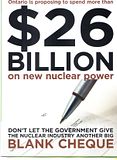Nuclear Waste Disposal
There is no reasonable and informed person who is supportive of nuclear power.
Why?
Disposal of nuclear waste.
Nuclear is a 'clean' form of energy during the energy production stage of its life, assuming one doesn't make a habit of spilling heavy water (this has happened at both Pickering and Bruce) or other mishaps.
The mining of uranium is somewhat deleterious to the environment, though in the scheme of things, were it possible to deal with the 'disaster factor' and the waste issues, I think this one could probably be abided.
****
The BIG issues: Waste Disposal with a radioactive life that stretches well into 10's of 1,000s of years, nuclear waste poses a serious environment risk and cost-factor into the indefinite future. A cost I might add that is never accounted for by our current or proposed plants. Current waste is stored on-site at our reactors, though the supply of space is not unlimited, and we have nowhere approved to relocate the waste safely to in the future.
When its said that nuclear power is cheap, that is only during the generation phase, and while not counting disposal costs.
The Disaster Scenario: Unfunded Liability.
I might add, that while any 'disaster' scenario is unlikely to say the least; its not like it can't happen, see 3-mile island and Chernobyl.
No private operator can obtain or could afford the insurance required to mitigate their liability if something ever went seriously wrong.
As a result government picks up the liability, substantially on an un-funded basis which is NOT charged to current power bills.
Even if one distributed the 'disaster' scenario costs over 1,000 years, and added only the most conservative of disposal costs, nuclear, when including one-time cost of construction is by far the least economically viable and least affordable means of power production.
I often find the politics of nuclear quite peculiar, as the champions of it in Ontario are often more to the 'free market' side of the political spectrum, but often see nothing wrong with the vast subsidies and guarantees the public must provide on behalf of the private sector in the Nuclear industry.
It strikes me that Nuclear is the GM of the energy world, privatize the profit, nationalize the risk!

****
I would simply finish by pointing out that Ontario has more than sufficient energy capabilities to supply its own needs, entirely by renewables over time.
It is true that Ontario's energy costs will rise in order to do this, but given comparatively cheap hydro former a portion of our supply, and both more wind and more sun than many European countries..who have thoughtfully done our pilot projects for us.....
I see no reason peak-power rates need to exceed 14c per/KWH, or general rates exceed 10c/per KWH to achieve that goal.
While this is double where we are today, its also BELOW market rates in most European countries and many U.S. states including New York and California.
There is no reason this should provide us any competitive disadvantage over time, if done properly and phased in.





